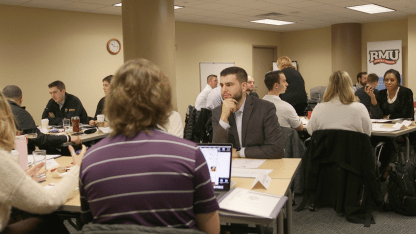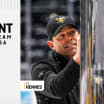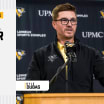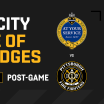Back in 2017, the Pittsburgh Penguins were doing an internal assessment of the organization.
The team was thriving on the ice, becoming the first team in the salary cap era to win back-to-back Stanley Cups. And the organization was having success off the ice as well, leading the NHL in many business-related categories like television ratings, game attendance, merchandise sales and social media reach.
But in order to stay on top of their game, the Penguins knew they had to make sure they were giving everyone in the organization the chance to grow. So the first area they looked at was leadership, as a smart, empowered and confident team can rise to any occasion.
Penguins Proud to Partner With RMU on Leadership Development
Robert Morris University has worked with the organization to provide customized leadership development programs for staff

That led to conversations with Robert Morris University, an innovator in the Pittsburgh region when it comes to developing employee skills and helping organizations meet their strategic goals. And during those conversations, Penguins chief revenue officer Terry Kalna said something that resonated with the team at RMU.
"I've seen a lot of organizations use that cliché phrase, what if we invest in our people and they leave?" Kalna said. "Well, what if you don't invest in them and they stay?"
That was the moment where their two philosophies came together and launched what has become a fantastic relationship, as RMU is the official leadership development partner of the Penguins. The team provides educational opportunities for RMU students, while the university provides customized leadership development opportunities to employees of all levels in the Penguins organization.
"That phrase gets to the root of something that is really important to us and that's really important to the Penguins," said Derya Jacobs, RMU's senior vice president of corporate relations and strategic initiatives. "Of course, employee retention is a benefit of this approach, but it's not the reason you do it. The reason you do it is because it is the right thing to do for people, the right thing to do for the Pittsburgh region, and the right thing to do as a company of any size."
The Penguins are incredibly proud to have partnered with a world-class institution like RMU and leverage their nationally recognized excellence to help their team members expand their skill sets and enhance their leadership abilities. They have been joined by a growing list of iconic Pittsburgh companies, including Eat'n Park, Koppers, and Pitt-Ohio.
"Investing in your people is the best spend that a company can make," Kalna said. "Organized, sustainable training for an employee workforce really helps to grow a company at a much higher rate than any other kind of development. My Penguins colleagues have learned, grown their confidence and built new relationships - among other things - through our leadership development initiatives with RMU."
That has helped the franchise remain one of the standard bearers not just in professional sports, but across all industries.
"We want to make sure we give our employees all of the tools that they need so that they can do their jobs with excellence," said Tracey McCants Lewis, Penguins vice president of human resources and deputy general counsel. "Our partnership with Robert Morris University has been a wonderful opportunity for us to bring the leadership expertise that they have to give our employees an opportunity to advance their careers."
Kalna praised RMU for how flexible they have been in working with the Penguins on those customized leadership development programs, which has allowed them to maximize the impact on their team. That is the unique part about the university's approach.
They understand that every industry is different, and every company is different. What works for the Penguins might not work for another organization. So RMU's multidisciplinary team of experts works closely with each client to find the ideal content and delivery model to develop employee skills - from fully custom engagements to more traditional business education programs - to help them meet their strategic goals and become value added to their internal efforts.
What's also unique is that the customization is a program-long activity. It starts with a lot of listening and discovery, building the training with various components (classroom, remote, on-site, off-site, etc.). Once it begins, RMU continues to tailor the program based on feedback from participants and the organization itself. Once it ends, they remain interested in the participants' success and how they are progressing through their career paths.
"We don't look at this as a transactional activity with the organization," Jacobs said. "With the Pittsburgh Penguins, when we say we are partners, we are partners in all ways. You get to know each other, and then one can pick up the phone and talk to the other about something that they want to brainstorm about, because now we are joining forces. Everybody's bringing their expertise together and really working closely to be successful in the long term."
Over the years, the Penguins and RMU have learned so much about each other and have evolved together - and the most valuable takeaway is how committed they both are to being the best of the best. And now, they both want to help other organizations do the same.
Especially since moving forward, making meaningful investments in employee development will be critical for companies of all shapes and sizes, particularly in the aftermath of the pandemic. Companies have discovered new ways to work, new ways to provide flexibility for their employees, and creative new ways to compete for talent.
"Our partnership evolved to say, okay - let's join forces, let's be leaders, let's tell the whole world what we're doing and why we're doing it and have others follow," Jacobs said. "The Penguins believe in employee development and retaining them through professional development. And at Robert Morris University, we have our students and we are educating them. But beyond that, we are also committed to the region in providing leadership development opportunities and employee development opportunities, and helping companies retain talent - not only within their organization, but also in the region."


















































